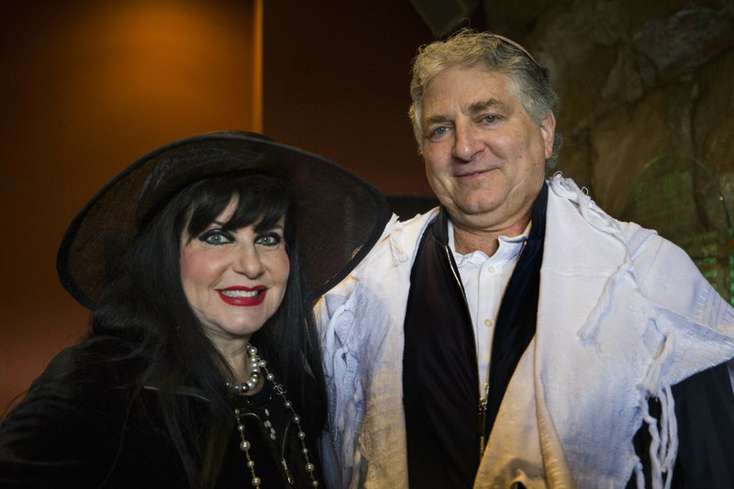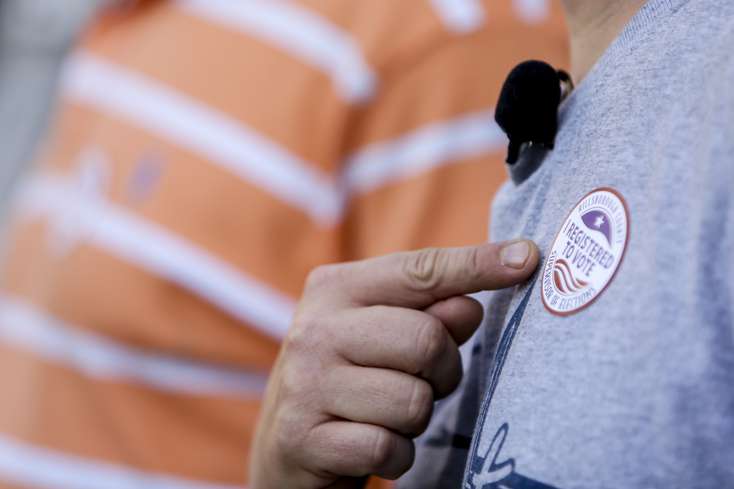HEBRON, West Bank — When travelers shop at dozens of duty free stores at airports worldwide, they may be paying for more than a bottle of vodka or a box of chocolates.
The Falic family of Florida, owners of the ubiquitous chain of Duty Free Americas shops, funds a generous and sometimes controversial philanthropic empire in Israel that runs through the corridors of power and stretches deep into the occupied West Bank. An Associated Press investigation shows that the family has donated at least $5.6 million to settler groups in the West Bank and east Jerusalem over the past decade, funding synagogues, schools and social services along with far-right causes considered extreme even in Israel.
The Falics support the ultranationalist Jewish community in Hebron, whose members include several prominent followers of a late rabbi banned from Israeli politics for his racist views, and whose movement is outlawed by the U.S. as a terrorist organization. They back Jewish groups that covertly buy up Palestinian properties in east Jerusalem, and they helped fund an unauthorized settlement outpost in the West Bank.
They have supported groups that are pushing for the establishment of a Third Temple for Jews at the holiest and most contested site in the Holy Land. They also have given more money than any other donor to Prime Minister Benjamin Netanyahu, a strong supporter of settlements, and have donated to other leaders of his Likud party.
The Falics’ philanthropy is not limited to the settlements, and they support many mainstream causes in the U.S. and Israel, such as hospitals, athletics and helping the needy. But they are a key example of how wealthy U.S. donors have bolstered the contentious settlement movement.
“Far-right foreign donors are a pillar of the settlement enterprise,” said Brian Reeves, a spokesman for Peace Now, an Israeli anti-settlement watchdog group.
Most of the world considers Jewish settlements in the West Bank and east Jerusalem to be obstacles to peace that gobble up territories claimed by the Palestinians for a future independent state. The international community overwhelmingly believes the settlements violate international law, which prohibits an occupying power from transferring its own population into the territory it occupies.
However, Israel considers the territories “disputed,” and says the fate of the settlements should be determined through negotiations.
In a response to AP questions through his lawyer, Simon Falic, who spoke on behalf of the family, said Jews should be able to live anywhere in the Holy Land, whether it’s Israel, Israeli-annexed east Jerusalem or the West Bank. He condemned violence and claimed none of the groups he supports do anything illegal under Israeli law.
“We are proud to support organizations that help promote Jewish life all over the Land of Israel,” said Falic, whose business is based in Miami, Florida. “The idea that the mere existence of Jewish life in any geographical area is an impediment to peace makes no sense to us.”
Since the capture of the West Bank and east Jerusalem in the 1967 Mideast war, the settler population has grown to about 700,000 people, roughly 10% of Israel’s Jewish population. In recent years, it has received a boost from Netanyahu’s pro-settler government and from a far more tolerant attitude by President Donald Trump, whose top Mideast advisers are longtime settlement supporters.
This growth has been fueled in part by fundraising arms for leading settlement groups in the United States, which allow them to collect tax-deductible contributions from thousands of American donors.
Data on American philanthropic support for settlements is limited, mainly due to a lack of transparency requirements. But according to a past investigation of U.S. tax forms by the Israeli daily Haaretz, fundraising organizations in the U.S. raised more than $230 million for settlement causes between 2009 and 2013 alone.
Other big donors include casino magnate Sheldon Adelson, a backer of Netanyahu and Trump, who donated $5 million in 2014 through his charitable foundation to the Israeli university in the West Bank settlement of Ariel, according to IRS records. Billionaire Ira Rennert, financier Roger Hertog and the U.S. ambassador to Israel, David Friedman, are also among prominent Jewish-American donors to settlement causes. The names of scores of lesser-known donors adorn buildings, playgrounds and even park benches throughout the West Bank.
The Falics stand out for the wide scope of groups they support and their close ties with leading Israeli politicians.
The family has two main charitable organizations, the U.S.-based Falic Family Private Foundation and the Segal Foundation in Israel. It is not clear whether the U.S. foundation contributed to the settlements, because its financial reports do not outline its recipients.
The Segal foundation, operating since 2007, gave away roughly $15 million in its first decade. This foundation’s financial reports also do not outline recipients, but the AP analysis identified at least $5.6 million in donations to settlement and far-right causes by searching through the Israeli records of more than two dozen settlement organizations. Other funds went to other causes, including the country’s amateur American football league, a Jerusalem hospital and a Jewish seminary in northern Israel.
Falic said the family’s support for Jewish life “should not imply the exclusion of anyone else, including Christians and Muslims.” However, critics say activities billed as harmless philanthropy have come at the expense of Palestinians and their claim to a state.
“Everyone should be aware that when they shop at ‘Duty Free Americas,’ their dollars could potentially finance some of the most extreme right-wing actors in Israel,” said Ran Cohen, founder of the Israeli Democratic Bloc, which aims to expose anti-democratic trends.
Duty Free Americas is headed by three Falic brothers: Simon, Jerome and Leon. The chain operates over 180 stores at airports and border crossings in the U.S. and Latin America, including New York’s JFK, Atlanta’s Hartsfield-Jackson, Ronald Reagan and Dulles in Washington, and Miami International, according to the company website. Leon Falic told the trade publication TRBusiness that the privately held company last year posted over $1.65 billion in sales.
Simon Falic said that under Jewish tradition, it is customary to donate 10% of one’s earnings to charity.
During the decade ending in 2017, they donated about $35 million, according to U.S. and Israeli tax records. Over that time, their U.S. foundation distributed about $20 million. Their U.S. tax filings say that nearly all of the foundation’s contributions went to “various worldwide Jewish organizations,” but do not offer details.
Simon Falic provided the AP with a detailed breakdown of the foundation’s 2017 donations, much of which went to mainstream Jewish causes such as WIZO, a women’s organization that operates scores of Israeli daycare centers, shelters and training programs; Friends of the IDF, a fundraising branch that assists Israeli soldiers; and Chabad, a network of religious institutions. They also contribute generously in the U.S. to medical research, synagogues and Jewish schools.
Most of their donations in Israel, however, do not appear in these forms. Instead, that money is channeled from Panamanian-based companies through the Israel-based Segal foundation, whose name is a Hebrew acronym based on the brothers’ first names.
Falic said the reason for this is not because Panama is a tax haven, but because his brother Leon lives there, and a number of their companies are based in Panama. But the lack of transparency there makes tracking their donations more difficult.
Falic described himself as a “big supporter” of Netanyahu, who has allowed Israeli settlements to flourish during his 10 years in office. Although Falic said he has not contributed to Netanyahu since 2014, collectively the Falics have donated more than $100,000 to Netanyahu over the years, making them his biggest donors, according to Israeli public records.
The Falics are also prominent figures in Israeli right-wing circles. In April, Simon Falic mingled with the mayor of Jerusalem, Ambassador Friedman and other dignitaries in the VIP section of a special Passover service at the Western Wall in Jerusalem. Friedman, Florida Sen. Rick Scott, Florida Gov. Ron DeSantis, evangelical preacher John Hagee, conservative TV host Mike Huckabee and Netanyahu’s son, Yair, have been among the many politicians and VIPs to attend parties at Simon Falic’s Jerusalem home.
The Falics also support American politicians, both Democratic and Republican. Since 2000, they have given over $1.7 million to pro-Israel politicians, including Trump, Florida Sen. Marco Rubio, New York Sen. Chuck Schumer and Florida Rep. Debbie Wasserman Schultz.
Oded Revivi, a settler leader, described Simon Falic and his family as generous and influential, but also modest and shunning publicity.
“You understand that he knows the most important people. He sits in the most influential junction,” said Revivi. “They’ve been extremely helpful and extremely generous.”
Among the projects and investments the Falics have in the West Bank is the Psagot winery, an award-winning vintner that is also a centerpiece of the burgeoning settler tourism industry. The family has also built a sprawling biblical theme park in the West Bank settlement of Shilo, revered as the ancient site of the biblical tabernacle. The site attracts tens of thousands of evangelical Christian tourists each year, but has also drawn criticism for what some say is a narrow historical interpretation that minimizes Muslim history.
The Falics funded the construction of a synagogue and mikveh, or ritual bath, in 2014 in what was then the unauthorized West Bank outpost of Kerem Reim. Kerem Reim was retroactively legalized three years later.
“All of these donations were entirely legal,” wrote Falic. “Any insinuation or allegation to the contrary is patently false and defamatory.”
Israeli records show the Falics also granted over $100,000 to two groups that seek the re-establishment of the Jewish Temple on a contested site in Jerusalem. Revered by Jews as the Temple Mount, that same area houses the Al-Aqsa Mosque, Islam’s third-holiest site. The competing claims to the hilltop compound are a frequent flashpoint of violence.
Falic said the family is not involved in efforts to establish the Third Temple. But he described Yehuda Glick, a former lawmaker and leading figure in the Third Temple movement, as a friend, and said he finds it “ludicrous” that Jews cannot pray at their holiest site. Glick, who survived a 2014 Palestinian assassination attempt, was among the guests at a Passover barbecue hosted by the Falics at the winery for families who had lost relatives in Palestinian attacks.
Perhaps the Falics’ most controversial area of activity is Hebron, a city where several hundred ultranationalist settlers live in heavily guarded enclaves amid some 200,000 Palestinians.
Relations between the populations are notoriously tense, and some of the Jewish leaders are followers of the late Rabbi Meir Kahane, whose “Kach” party was outlawed in Israel in the 1980s for calling for a mass expulsion of Arabs from the country. The U.S. also branded Kach a terrorist group.
Falic’s associates in Hebron include Baruch Marzel, Kahane’s former aide, who remains a prominent political activist in Israel.
According to the AP analysis, the Falics donated roughly $600,000 to “Hachnasat Orchim Hebron,” a group that hosts visitors to the Jewish community and provides snacks to Israeli soldiers protecting the settlers. Marzel’s wife Sarah is one of the group’s founders, and Marzel is deeply involved.
They also have given about $50,000 to the “Fund for the Rescue of the People of Israel,” which served as a fundraising arm of Lehava, a group that opposes Jewish-Arab couples in an anti-assimilation campaign and often is accused of using intimidation or even violence.
Falic said he was not aware of any connection to Lehava, and said the donations, made in 2011 and 2012, were to assist needy families. He noted that he opposes assimilation and intermarriage but also rejects violence. Israeli financial records show the fund has links to several Kahane disciples, including Marzel.
Marzel is a well-known figure in Israel, easily recognized with a wild brown beard. He continues to call for mass expulsions of Arabs, and has a long history of clashes with the police. During the recent election campaign, he was a leading figure in “Jewish Power,” a hard-line party led by Kahane followers.
Marzel said the Falics “do a lot of good things” and called them “good Jews,” but said they did not work closely together. Yet photos and videos on Facebook show Simon Falic and Marzel warmly embracing at social events in Hebron and Jerusalem. In one 2016 video, taken at Falic’s spacious Jerusalem home, the two men and Third Temple activist Glick hug and sway together as a well-known Israeli pop singer serenades them.
Falic said his connections to Marzel were primarily through a “beautiful project” that runs food trucks serving pizza, ice cream and snacks to Israeli soldiers protecting the residents of Hebron.
“While I may not agree with everything he has said, the work we have done that has been affiliated with the Hebron community has been positive, non-controversial and enhances Jewish life in the Hebron area — which we strongly support,” he said.
Issa Amro, a Palestinian activist in Hebron, disagrees. He said the seemingly harmless project serves the settler cause at the expense of Palestinians.
“We are suffering from settler violence,” he said. “When I tell the soldiers ‘protect me,’ they tell me ‘we are not here to protect you. We are with our own people, who are the settlers.’”
In Jerusalem, the family contributed more than $1 million to causes affiliated with Ateret Cohanim, which facilitates the sale of Palestinian properties in and around the Old City to Jewish settlers, an act of treason in Palestinian society.
Aviv Tartasky of Ir Amim, a monitoring group looking at Israeli-Palestinian relations in Jerusalem, said Ateret Cohanim often hides the identities of the purchasers, who are religious, nationalist Jews.
“When they come to live inside a Palestinian community, it can disrupt life for the community,” he said.
Ateret Cohanim says the Jewish people have a right to live anywhere in Jerusalem. Executive director Daniel Luria declined to comment on the Falic family, saying he does not discuss his donors.
But Falic doesn’t hide his support for what he called Ateret Cohanim’s efforts “to bring Jewish life back to all of Jerusalem.”
“It is unfortunate,” he added, “that a Jewish family dedicated to this cause is newsworthy.”









